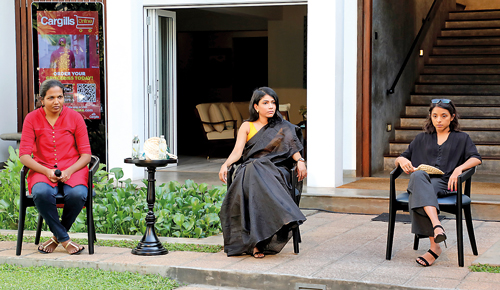Vital to give platform to unsung community workers

The panel of speakers at the Cargills International Women’s Day Festival Day 1: Left to right, Amalini De Sayrah, Yamini Ravindran and Sarah Kabir. Pic by M.A. Pushpa Kumara
“On the ground, women are some of the most active in engaging with their communities in creating conversation and safe spaces,” writer, researcher and activist Amalini De Sayrah says, pointing out how vital it is to make the extra effort to bring those women representatives of various communities around the country, that have seen the brunt of the conflict, to the policy-making table.
Much of what she has learned comes from small women’s groups in marginalised communities who are actively supporting long-term meaningful change, though the spotlight is rarely shone on them as the focus is on those in Colombo in proximity to centres of power, she noted.
Amalini was speaking at the session on ‘The Peace Prompters’, that featured women activists who have been working for peace, reconciliation and nation building at the Cargills International Women’s Day Festival organised to mark International Women’s Day. The panel also featured author and researcher on peacebuilding and reconciliation Sarah Kabir and Director for Legal & Advocacy, National Christian Evangelical Alliance of Sri Lanka (NCEASL)Yamini Ravindran.
In the context of war and conflict, Yamini points out that women bring a unique perspective both in the role they play in their communities, as well as the possible solutions that draw on their experiences. These perspectives are vital to the cause of true peace, which is the work involved in dignity and wellbeing for all individuals rather than simply the absence of war or conflict.
The Festival – The Changemakers, a collaboration between online digital programme Kaleidoscope with Savithri Rodrigo and Table by Taru at Lake Lodge, dedicates the month of March to celebrating women’s ability to transform, adapt and be the change, while also stimulating debate, building knowledge, expanding networks of champions and advocating gender equality. It is being held each Monday in March (1, 8, 15 and 22).
Speaking at the event, host Savithri observed that though it has been 21 years since the UN Security Council passed the landmark resolution on women, peace and security there is still a notable lack of equal participation and incorporation of different gender perspectives.
As such, very few women have navigated language barriers and racial, ethnic, religious, and cultural demarcations beyond the gender dimensions to facilitate a more proactive engagement. It is in this knowledge that the panel aimed to shed light on the challenges and barriers that women face in this context, while discussing these issues based on their experiences.
As an attorney-at-law, Yamini’s transition from corporate and commercial law to her true passion of advocating for human rights stemmed from her faith and belief in justice and peace. By connecting with organisations such as NCEASL, she came to realise the impact of even the smallest acts of change.
Yamini also highlights the importance of protection for women in this line of work so they can continue to effect meaningful change, both in a practical sense as well as through legislative mechanisms and structural changes. With the MMDA as an example, Yamini observes that women have worked to bring reform as well as neutrality and maturity to the religious discourse, at a community and national level.
“As much as we say women need to come to the forefront and do this work… there is a system of intimidation and pressure that disproportionately impacts women,” Amalini added.
Though strict cultural expectations and patriarchal systems can stunt the efforts of women engaging in this kind of work, Sarah believes that there are still ways in which women can get involved in a meaningful manner, even informally in their households. However, the onus still falls on those with existing privilege to open the necessary doors.
“I think the privileged of us are the most apathetic, because we have so much strength to actually influence policy, to create spaces, to get more women engaged. But most of us who have the luxury to think about these things rarely ever do until it really hits home,” Sarah observes.



